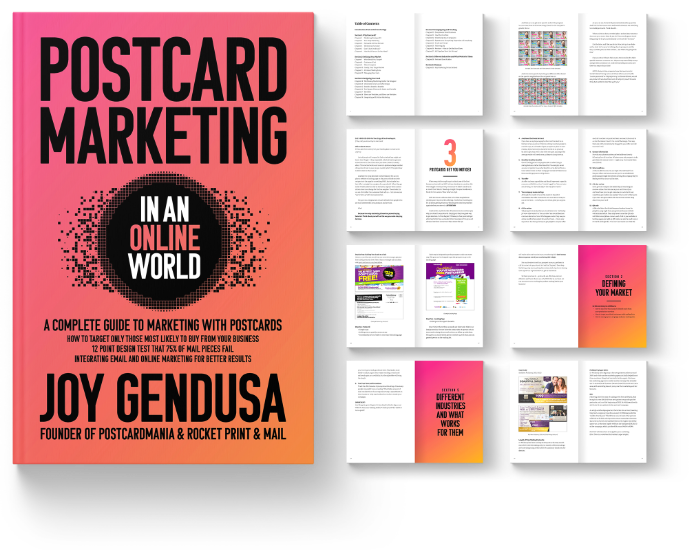This is a question that I hear all the time from business owners, and I understand why — email is cheap, and so are business owners! I know because I am a business owner. We are always trying to find the most cost-effective course of action. While this is a good thing, sometimes we incorrectly evaluate the costs.
Is email cheaper than direct mail? Absolutely, initial expense-wise.
But there is more to evaluate here. I’d like to ask you, the reader, what you prefer. Do you feel trust and affinity for a company — one you’ve never dealt with before and never given your email address to — if they send you an email to advertise their wares? Do you enjoy being interrupted as you work with emails in your inbox from companies you’ve never done business with? How do you feel about companies that send you an email that sounds like you’ve been corresponding with them, but you draw a blank and then realize they’re trying to trick you?
The reason people continue to prefer direct mail (as many surveys have revealed over the years) is that they are becoming more and more inundated with junk mail in their digital inbox. I know that I personally HATE getting email from a business that I didn’t give my email address to, and I know I’m not alone in that.
So now we need to add to the cost of email the possibility of turning off prospective customers. How much revenue will you LOSE because people got “spammed” by you and will now NEVER do business with you? Pretty tough to calculate, I’d say!
Maybe the first 2 times the recipient simply deletes the unwanted email with no emotion whatsoever. But after the third time, you’ve now totally irritated them. We just don’t know. All I can say is, whenever I give a marketing seminar, I ask the audience this question: “How many of you like receiving emails from businesses you never gave your email address out to?” I never get a single hand raised in response.
I go on to ask, “How many of you feel distrust when you get an unsolicited email?” All the hands go up.
Now the price difference isn’t looking so large, is it? Unless, of course, you’re not interested in the long-term effects and you just want to make a quick buck and bail. In that case, perhaps it doesn’t matter if you upset most of the recipients as long as the instant response is good.
This brings up the classic email marketing debate: Is email a lead generation tool or a follow-up tool?
You will be able to find marketing professionals on either side of the debate, but it will be very heavily against using email for lead generation. I’m hard-pressed to find even one quote in favor of email as a lead-gen tool. However, it was quite easy to get a quote against this practice. Here is one from the website of leading email-marketing provider, iContact:
Having customers sign up directly on your website is a surefire way to build a quality list. Avoid the temptation to rent or buy a list through a third party. Doing this will only cause you problems in the long run. Issues can include poor list quality, increased chance of being flagged as spam and potential loss of reputation.
I invite you to do a Google search on “email as a lead generation tool” or something similar. You will get loads of companies eager to sell you a list of email addresses! Please look into this carefully. You will hear “we don’t support spamming,” “these are opt-in lists,” and “folks gave their email address and want the data.” OH PLEASE! That’s all I can say! I’m on those lists and you are, too. Do you really recall GIVING your email address to an opt-in list? Most likely, you forgot to uncheck a box on a fill-in form and BOOM — you opted in!
Yahoo, Gmail, Hotmail and all the larger email service providers do their best to stop companies from abusing their clients’ addresses and will block abusers. However, now there are ways to beat the system. My contention is this: if you have to “beat the system,” how ethical is that? Okay, I’m ranting a bit now. I need not tell you what side of the argument I’m on. To me, the answer is clear: email is a follow-up marketing tool.
Yes, some companies in very specific circumstances will have great success generating leads through email marketing. My friend has a company that used to cold call people at home asking if they’d like to change their energy provider. Email is far less intrusive than a call from a stranger during dinner. He has turned to spam to get new clients for this and he doesn’t have a problem because truthfully, if he can save them money on their energy bill, they are happy to be informed of this!
However, in most cases, it simply isn’t the best way to get leads for your business. It is cheap, but the response rates are dismal (maybe .000005%), and, as we’ve discussed, there is a VERY good chance you are simply turning off large numbers of potential customers before they ever get a chance to interact with your company.
The optimal use of email marketing is to follow-up with leads you generate through outlets like direct mail, Google ads or television, etc. Once the prospect has agreed to receive communications from your company, they are less likely to dismiss your email or, worse, mark it as SPAM.
By using email and direct mail in the correct way, you maximize your return on investment from your marketing. And that’s what we’re all after, isn’t it?
I’ll discuss exactly how to use email as a follow-up tool in Chapter 19: Integrating with Online Marketing.
Postcard Marketing in an Online World
By Joy Gendusa, Founder/CEO PostcardMania

